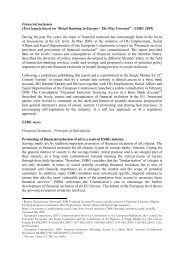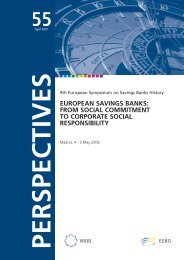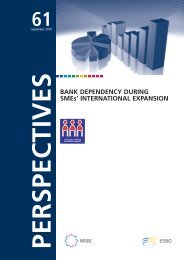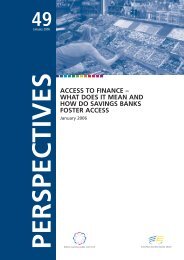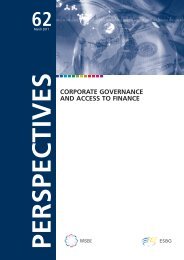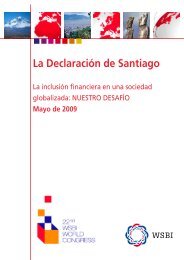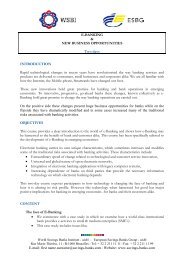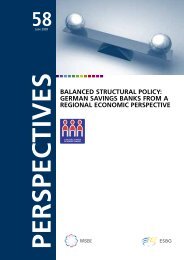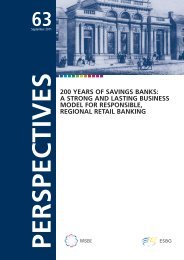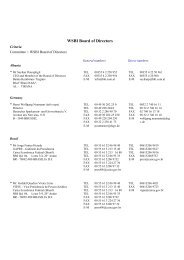A comparative analysis of the US and EU retail banking markets - Wsbi
A comparative analysis of the US and EU retail banking markets - Wsbi
A comparative analysis of the US and EU retail banking markets - Wsbi
Create successful ePaper yourself
Turn your PDF publications into a flip-book with our unique Google optimized e-Paper software.
State credit unions were first exempted from federal<br />
income tax in a 1917 administrative ruling <strong>of</strong> <strong>the</strong> U.S.<br />
Attorney General 61 on <strong>the</strong> grounds that <strong>the</strong>y closely<br />
resembled <strong>the</strong> cooperative banks <strong>and</strong> similar<br />
institutions that had been expressly exempted from<br />
tax by legislation.<br />
By 1937, after <strong>the</strong> establishment <strong>of</strong> federally chartered<br />
credit unions in 1934, some states had begun to<br />
tax federal credit unions. Since virtually all o<strong>the</strong>r<br />
cooperative organisations including mutual savings<br />
banks, mutual insurance companies <strong>and</strong> mutual<br />
savings <strong>and</strong> loans were tax exempt at that time,<br />
Congress amended <strong>the</strong> Federal Credit Union Act to<br />
exempt federally chartered credit unions from<br />
substantially all taxes, too 62 .<br />
In 1951, Congress preserved <strong>the</strong> tax exempt status<br />
<strong>of</strong> state-chartered credit unions 63 . Although this<br />
exemption applies to both state <strong>and</strong> federal credit<br />
unions, federal credit unions enjoy <strong>the</strong> broader tax<br />
exemption enacted by Congress in 1937.<br />
The institutions with which credit unions were<br />
identified when <strong>the</strong>ir tax exemption was initially<br />
granted lost <strong>the</strong>ir tax exemptions in 1951 when <strong>the</strong>y<br />
had reached <strong>the</strong> point <strong>of</strong> “active competition” 64 with<br />
taxable institutions. Although this point has also<br />
been reached with regard to credit unions, <strong>the</strong> tax<br />
advantage for <strong>the</strong>m still exists today.<br />
3.2.1.1.5 Mortgage banks<br />
During <strong>the</strong> savings <strong>and</strong> loan crisis in <strong>the</strong> 1980’s a lack<br />
<strong>of</strong> capital forced institutions to remove loans from<br />
<strong>the</strong>ir balance sheets through securitisation. Those<br />
circumstances provided an opportunity for a new<br />
type <strong>of</strong> lender, <strong>the</strong> mortgage banks, which originate<br />
<strong>and</strong> warehouse mortgage loans for a short period<br />
before reselling <strong>the</strong>m.<br />
Mortgage banks in <strong>the</strong> <strong>US</strong> do not operate under a<br />
bank charter. Instead, <strong>the</strong>y need a special mortgage<br />
<strong>banking</strong> licence, to be issued by <strong>the</strong> respective state<br />
department (for example <strong>the</strong> department <strong>of</strong><br />
corporations or <strong>the</strong> mortgage lending division).<br />
As mentioned above, <strong>the</strong> main business <strong>of</strong> mortgage<br />
banks is to originate <strong>and</strong> package mortgage loans,<br />
holding <strong>the</strong>m on <strong>the</strong> balance sheet for a short period<br />
<strong>of</strong> time before selling <strong>the</strong>m into <strong>the</strong> secondary market.<br />
Primarily, loans are sold to <strong>the</strong> <strong>US</strong> government<br />
sponsored agencies Ginnie Mae, Freddie Mac <strong>and</strong><br />
Fannie Mae that bundle <strong>the</strong>m <strong>and</strong> issue so called<br />
mortgage backed securities.<br />
3.2.1.1.6 Non-<strong>banking</strong> institutions <strong>of</strong>fering<br />
financial services<br />
Non-<strong>banking</strong> institutions <strong>of</strong>fering financial services in<br />
<strong>the</strong> <strong>US</strong> are called non-bank banks or limited service<br />
banks. Both terms arose because <strong>of</strong> <strong>the</strong> “<strong>and</strong>” in <strong>the</strong><br />
Bank Holding Company Act’s definition <strong>of</strong> a bank:<br />
According to <strong>the</strong> Act a bank is an organisation that<br />
"accepts dem<strong>and</strong> deposits <strong>and</strong> makes commercial<br />
loans." Thus, a financial institution that ei<strong>the</strong>r only<br />
accepts dem<strong>and</strong> deposits or only makes commercial<br />
loans but does not do both, is not a bank for <strong>the</strong><br />
purposes <strong>of</strong> <strong>the</strong> Bank Holding Company Act.<br />
Because limited-service institutions fail to satisfy<br />
<strong>the</strong> legal definition <strong>of</strong> a bank, nei<strong>the</strong>r <strong>the</strong>ir parent<br />
corporations nor o<strong>the</strong>r subsidiaries are subject to <strong>the</strong><br />
strictures imposed by <strong>the</strong> act. They may engage in any<br />
activities <strong>the</strong>y wish, including activities that are closed<br />
to traditional banks <strong>and</strong> to bank holding companies<br />
– manufacturing, <strong>retail</strong>ing, corporate securities<br />
underwriting, <strong>and</strong> insurance brokerage, to name a<br />
few. Anyone can acquire a non-bank bank <strong>and</strong> this<br />
can be done anywhere, breaching <strong>the</strong> still existing<br />
legal geographic restrictions for banks as well 65 .<br />
Companies in a wide range <strong>of</strong> industries have<br />
acquired limited-service banks. They have done so<br />
for a variety <strong>of</strong> reasons: Gulf & Western 66 , one <strong>of</strong> <strong>the</strong><br />
first companies to acquire a limited-service bank, did<br />
so to support its credit card <strong>and</strong> consumer lending<br />
activities. Merrill Lynch obtained its non-bank bank<br />
so that it could process its cash management account<br />
customers' check <strong>and</strong> credit card transactions in-house.<br />
O<strong>the</strong>r firms have acquired non-bank banks in order<br />
to <strong>of</strong>fer customers access to <strong>the</strong>ir funds through<br />
nationwide automatic teller machine networks.<br />
61 Op. Att’y Gen. 176 (1917).<br />
62 Pub. L. No.416, c. 3, section 4, 51 Stat. 4 (Dec. 6, 1937); Section 122 <strong>of</strong> <strong>the</strong> Federal Credit Union Act (12 U.S.C. § 1768).<br />
63 Now section 5(c)(14)(A) <strong>of</strong> <strong>the</strong> Internal Revenue Code.<br />
64 See Senate Report No. 781 <strong>of</strong> 1951.<br />
65 See section on regulatory trends in <strong>the</strong> <strong>US</strong> in <strong>the</strong> chapter on regulatory issues for more detailed information on <strong>the</strong>se restrictions.<br />
66 Gulf & Western was a <strong>US</strong> conglomerate <strong>the</strong> legal successor <strong>of</strong> which is Viacom.<br />
31



